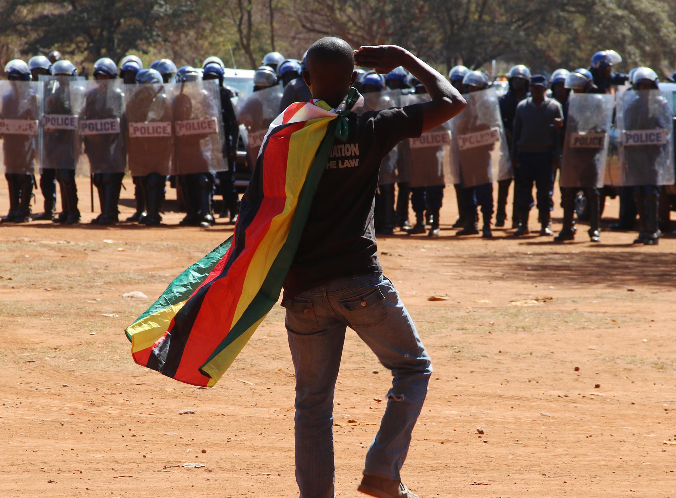Zimbabwe cracks down on protest ‘#ThisFlag’ movement – by banning sale of flags
Justice minister says anyone caught ‘bringing flag into disrepute’ faces up to a year in jail

Your support helps us to tell the story
From reproductive rights to climate change to Big Tech, The Independent is on the ground when the story is developing. Whether it's investigating the financials of Elon Musk's pro-Trump PAC or producing our latest documentary, 'The A Word', which shines a light on the American women fighting for reproductive rights, we know how important it is to parse out the facts from the messaging.
At such a critical moment in US history, we need reporters on the ground. Your donation allows us to keep sending journalists to speak to both sides of the story.
The Independent is trusted by Americans across the entire political spectrum. And unlike many other quality news outlets, we choose not to lock Americans out of our reporting and analysis with paywalls. We believe quality journalism should be available to everyone, paid for by those who can afford it.
Your support makes all the difference.The government of Zimbabwe has warned that anyone who sells or displays the national flag could face up to a year in prison, after it became a symbol of protest against the regime of President Robert Mugabe.
Sales of the flag boomed after it was worn by the pastor Evan Mawarire in a video despairing at the country’s economic crisis, sparking the #ThisFlag social media movement.
State media outlets have accused protesters of “using the flag to whip up political emotions against the constitutionally elected government”.
And a warning has now been issued reminding citizens that, under Zimbabwean law, it is illegal to “manufacture, sell or use” the flag without the written permission of the Justice Secretary, Virginia Mabhiza.
In a statement on Tuesday, she said: “Members of the public who engage in any action or activity which involves the manufacture, sale or use of the national flag in contravention of the law are therefore warned that they are liable to prosecution and are liable to imprisonment if they are found guilty by a court of law.”
Under the Flag of Zimbabwe Act, the maximum sentence for “bringing it into disrepute” stands at £300 or a prison sentence of one year.
Speaking in Gweru last week, Ms Mabhiza was asked about the use of the flag in protest movements.
Then, she said: “Our flag is very important and we therefore encourage the public to respect it.
“Failure to respect the national flag can land one in prison or be forced to pay a fine of $300 or both. There are certain things that people do that are tantamount to abuse and disrespect of the national flag.”
Mr Mawarire has fled Zimbabwe to the US, where he is leading protests against Mr Mugabe’s delegation to the UN General Assembly in New York.
He has emerged as an unlikely protest leader amid growing anger at the country’s desperate financial situation. The government has repeatedly been forced to delay salary payments to civil servants, and this week it released a schedule showing members of the armed forces would be paid before all other branches of public office.
Promise Mkwananzi, leader of #Tajamuka movement, which has used social media to organise protests together with the #ThisFlag, said his group would continue to use the flag despite the government threat.
“It is total insanity that government should ban citizens from using their own flag,” Mkwananzi told the Reuters news agency. “We are going to continue to make use of our flag. It is our identity.”
Join our commenting forum
Join thought-provoking conversations, follow other Independent readers and see their replies
Comments